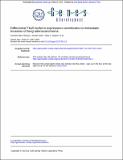Differential Tks5 isoform expression contributes to metastatic invasion of lung adenocarcinoma
Author(s)
Chen, Guoan; Dayton, Talya Lucia; Kim-Kiselak, Caroline; Hoersch, Sebastian; Whittaker, Charles A.; Bronson, Roderick T.; Beer, David G.; Winslow, Monte M.; Li, Carman Man-Chung; Jacks, Tyler E; ... Show more Show less
DownloadJacks_Differential Tks5.pdf (1.318Mb)
PUBLISHER_CC
Publisher with Creative Commons License
Creative Commons Attribution
Terms of use
Metadata
Show full item recordAbstract
Metastasis accounts for the vast majority of cancer-related deaths, yet the molecular mechanisms that drive metastatic spread remain poorly understood. Here we report that Tks5, which has been linked to the formation of proteolytic cellular protrusions known as invadopodia, undergoes an isoform switch during metastatic progression in a genetically engineered mouse model of lung adenocarcinoma. Nonmetastatic primary tumor-derived cells predominantly expressed a short isoform, Tks5short, while metastatic primary tumor- and metastasis-derived cells acquired increased expression of the full-length isoform Tks5long. This elevation of Tks5long to Tks5short ratio correlated with a commensurate increase in invadopodia activity in metastatic cells compared with nonmetastatic cells. Further characterization of these isoforms by knockdown and overexpression experiments demonstrated that Tks5long promoted invadopodia in vitro and increased metastasis in transplant models and an autochthonous model of lung adenocarcinoma. Conversely, Tks5short decreased invadopodia stability and proteolysis, acting as a natural dominant-negative inhibitor to Tks5long. Importantly, high Tks5long and low Tks5short expressions in human lung adenocarcinomas correlated with metastatic disease and predicted worse survival of early stage patients. These data indicate that tipping the Tks5 isoform balance to a high Tks5long to Tks5short ratio promotes invadopodia-mediated invasion and metastasis.
Date issued
2013-07Department
Massachusetts Institute of Technology. Department of Biology; Koch Institute for Integrative Cancer Research at MITJournal
Genes & Development
Publisher
Cold Spring Harbor Laboratory Press
Citation
Li, C. M.-C., G. Chen, T. L. Dayton, C. Kim-Kiselak, S. Hoersch, C. A. Whittaker, R. T. Bronson, D. G. Beer, M. M. Winslow, and T. Jacks. “Differential Tks5 Isoform Expression Contributes to Metastatic Invasion of Lung Adenocarcinoma.” Genes & Development 27, no. 14 (July 15, 2013): 1557–1567.
Version: Final published version
ISSN
0890-9369